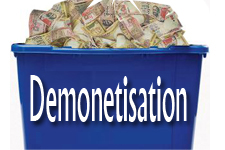Demonetisation - Objectives like countering FICN, black money and terrorism cannot be achieved without restrictions: HC
By TIOL News Service
BANGALORE, DEC 14, 2016: THE petitioners submit that the restrictions imposed by the impugned notification is unenforceable in the absence of proclamation of financial emergency under Article 360 of the Constitution of India. The restriction that one customer cannot draw more than Rs.24,000/- per week from his/her/its account in the bank is not traceable to any statutory provision.
The high Court observed,
The Union Government and the Reserve Bank of India have come out with the demonetization scheme to tackle the menaces of fake currency notes, black money and terrorism. These laudable objectives cannot be achieved without imposing certain restrictions. In the larger interests of the society, when a comprehensive mission is being accomplished, certain regulatory measures during the period of transition are bound to affect the interests of some sections of people. There cannot be any dispute that the collateral damage, if any, on any section is to be minimized, if it cannot be avoided. What steps are to be taken and within what time-frame they are to be taken, are the matters for the Central Government and Reserve Bank of India to decide.
The menaces of black money, fake currency and terrorism are hydra-headed monsters. When one head of the monster is chopped off, it would raise its other ugly heads. Stamping them out is indeed a herculean task. It is next only to impossible for any policy-maker or decision-maker to anticipate all the difficulties and contingencies. As and when the difficulties are noticed in the course of implementing the policy, the necessary remedial measures have to be taken.
It is immensely profitable to refer to what the Apex Court had to say in the case of BALCO EMPLOYEES' UNION (REGD.) v. UNION OF INDIA AND OTHERS =2002-TIOL-91-SC-DISINVESTMENT-LB in paragraph Nos.92 and 93 of its decision.
"92. In a democracy, it is the prerogative of each elected Government to follow its own policy. Often a change in Government may result in the shift in focus or change in economic policies. Any such change may result in adversely affecting some vested interests. Unless any illegality is committed in the execution of the policy or the same is contrary to law or mala fide, a decision bringing about change cannot per se be interfered with by the Court.
93. Wisdom and advisability of economic policies are ordinarily not amenable to judicial review unless it can be demonstrated that the policy is contrary to any statutory provision or the Constitution. In other words, it is not for the courts to consider relative merits of different economic policies and consider whether a wiser or better one can be evolved. For testing the correctness of a policy, the appropriate forum is Parliament and not the courts. Here the policy was tested and the motion defeated in the Lok Sabha on 1-3-2001."
In the case of INDIA CEMENT LTD. AND OTHERS v. UNION OF INDIA AND OTHERS, the Hon'ble Supreme Court has held that even if some persons are at a disadvantage and suffer losses on account of the formulation and implementation of the government policy, that is not by itself a sufficient ground for interference by the court.
The administrators and legislators are entitled to frame policies and take such administrative decisions, as they think necessary in the public interest. The courts should not ordinarily interfere with the policy-decisions, unless they are manifestly illegal and arbitrary. In this regard, refer to what the Apex Court had to say in paragraph Nos.45 and 46 of its decision in the case of Bajaj Hindustan Limited .
"45. In our opinion there should be judicial restraint in fiscal and economic regulatory measures. The State should not be hampered by the Court in such measures unless they are clearly illegal or unconstitutional. All administrative decisions in the economic and social spheres are essentially ad hoc and experimental. Since economic matters are extremely complicated this inevitably entails special treatment for distinct social phenomena. The State must therefore be left with wide latitude in devising ways and means of imposing fiscal regulatory measures, and the Court should not, unless compelled by the statute or by the Constitution, encroach into this field.
46. In our opinion, it will make no difference whether the policy has been framed by the legislature or the executive and in either case there should be judicial restraint. The Court can invalidate an executive policy only when it is clearly violative of some provisions of the statute or Constitution or is shockingly arbitrary but not otherwise."
It is also helpful to refer to the Hon'ble Supreme Court's decision in the case of PATHAN MOHAMMED SULEMAN REHMATKHAN v. STATE OF GUJARAT AND OTHERS, wherein it is held that it is open to the State and its instrumentalities to take economic and management decisions depending upon the exigencies of the situation, guided by the appropriate financial policy notified in public interest. If every decision taken by the State is tested by a microscopic and a suspicious eye, administration will come to a standstill and the decision-makers will lose all their initiative and enthusiasm.
The challenges to Clause 2(vi) of the notification, dated 8.11.2016, circulars, dated 14.11.2016 and 21.11.2016 fail.
These writ petitions are dismissed.
(See 2016-TIOL-3003-HC-KAR-MISC)
















